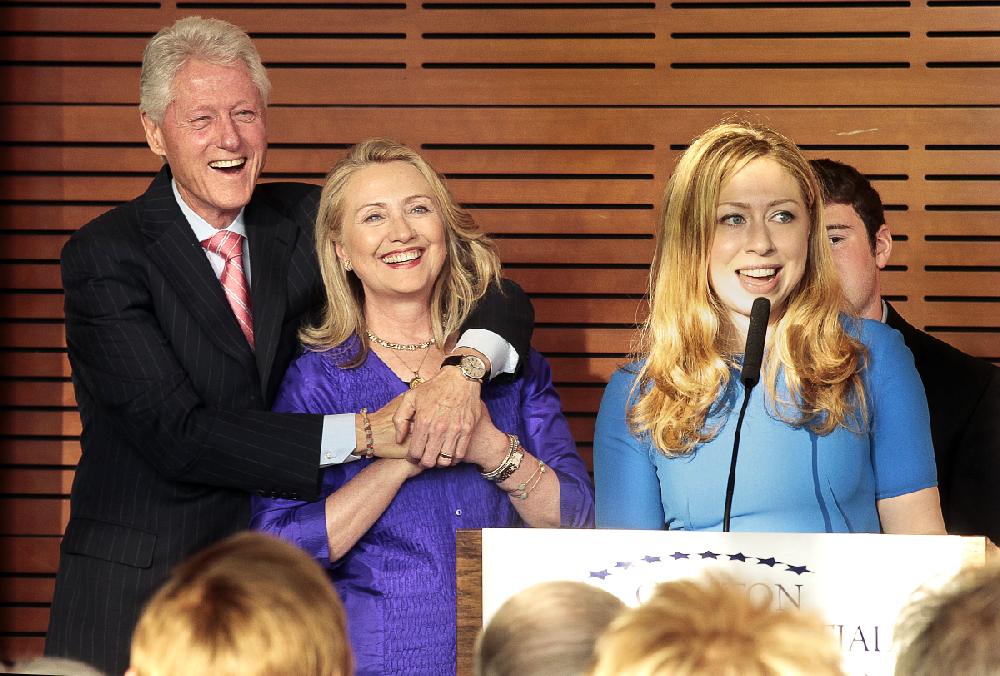WASHINGTON - The National Archives and Records Administration released about 7,500 more pages of records from Bill Clinton’s time as president Friday, some of which detail staff efforts to soften Hillary Rodham Clinton’s image.

Clintons
Staff members worried that a strong first lady would make her husband look weak, documents show.
The approximately 7,500pages are split into 111 categories, including public diplomacy, the Oklahoma City bombing, the 1994 genocide in Rwanda and the White House Fellowship program.
Under the Presidential Records Act of 1978, presidents can seal records dealing with appointments to federal office or confidential advice from advisers for 12 years after they leave office. Clinton left office on Jan. 20, 2001.
Friday’s release is the fourth and largest installment released since February, when Politico reported that 33,000 pages of the Clintons’ records had not been made public after the restriction on their release expired in January 2013. The Archives has released about 19,000 pages of records since the article was published.
Each category represents information requested under a Freedom of Information Act request that fell under the Presidential Records Act exemption. The documents are available at the Clinton Presidential Library and online at http://clintonlibrary.gov/formerlywithhelddocuments.html.
Interest in the documents has escalated because of how they may reflect on Hillary Clinton, the former first lady, U.S. senator, secretary of state and 2008 presidential candidate who is thought to be weighing a 2016 White House bid.
A 1993 Clinton administration memo in the latest batch shows that White House staff members were working to soften the first lady’s public image. The nine-page memo notes that the president’s poll numbers had dropped.
“The stronger you appear, the weaker the President appears,” it states. “Conversely, if he seems weak, your intelligence, strength and decisiveness increasingly are viewed as negatives because they are portrayed in contrast to him.”
The memo goes on to say the public had a more favorable impression of Hillary Clinton during the first presidential campaign, but that opinion changed due to her work on health-care policy. It encourages her to pick issues that “accentuate your personal rather than political, wonky side” and reveal more of her humor.
The records also include the president’s schedule from Nov. 15 and Nov. 17, 1995, which are dates of sexual encounters between Clinton and Monica Lewinsky, according to the Starr Report, the investigation by Independent Counsel Kenneth Starr that disclosed details of the affair that led to Clinton’s impeachment.
In a separate folder about retired Army Gen. Wesley Clark, an email from Lewinsky’s Pentagon email account to her friend and Starr Report confidant Ashley Raines is redacted. Raines was a White House staff member, and Lewinsky worked at the Pentagon after serving as a White House intern.
According to the code given on the redacted document list, the email was omitted for privacy reasons. The subject line of the four-page email sent Oct. 22, 1997, is “medical report.”
Lists of pages that are redacted or omitted appear frequently among the thousands of pages of documents released since February.
The records also show the administration weighed whether the president should address the Lewinsky scandal during the 1999 State of the Union address. In a memo, Clinton aide Sidney Blumenthal wrote that the speech would be viewed through the prism of the affair and the resulting political fallout.
“The scandal is an unavoidable subject,” he wrote. “Indeed, the entire address will be viewed in its shadow and should be dealt with - by inference. Through the speech, the President can establish, without ever explicitly saying so, the larger political reasons his presidency has been under unprecedented attack. He can do so without ever saying a cross word. On the contrary, his tone can be completely positive.”
The records also include:
A proposed response from Bill Clinton regarding an offer to appear on Don Imus’ radio show. “A serious request deserves a serious response: no,” it states. The letter provides several examples of what the word no means, including “Hell no,” “Notta chance” and “Right after I go on Rush Limbaugh.” It is signed “now leave me alone. Sincerely yours, WJC.”
The response is included in an unrelated Oct. 20, 1999, email.
A transcript of an Aug. 2, 1994, conversation Clinton had with advisers in which he joked that the economy was doing well because the public was focused on scandals revolving around him instead of the economy.
“If we had actually devised a strategy to cover all this up to the American people we would have been less successful than we have,” he said in the transcript.
A 1993 memo warning against scheduling any events or interviews for the president on the 30th anniversary of the assassination of President John F. Kennedy.
“The public mind is already stamped with images of Clinton at Kennedy’s grave site, and with Kennedy’s family on a yacht off Martha’s Vineyard,” speechwriter Carter Wilkie wrote. “Anything more will tempt an irreverent press corps to charge overkill, hero worship, or worse.”
A category labeled “Asa Hutchinson” consisting of a letter to U.S. Rep. Frank Wolf about giving China permanent “normal trade relations” status. Hutchinson, who now is running for Arkansas governor, is not named or referenced in the letter.
A file marked “Oprah Winfrey” that includes biographical information about now former Mississippi Gov. Ronnie Musgrove but making no reference to the media mogul.
A series of memos about the possibility of repurchasing the former presidential yacht. In 1994, Clinton staff debated how fully the president should endorse a nonprofit group’s plan to re-buy the USS Sequoia, for the president’s use, and noted that it was raising money from Kuwaiti donors. President Jimmy Carter sold the yacht in 1977.
Staff members were instructed to tell donors that “President Clinton is aware of this effort and deems it worthy and appropriate, but may never avail himself of personal use of the Sequoia.”
The yacht remains privately owned, docked in Washington, D.C., and is available for rent.
A January 2000 email between staff members that appears to be about who should be seated with the first lady during the State of the Union. It called Gen. Clark “taboo” and said Matthew Shepard’s parents would provide a “hate crime hit.” Shepard, a gay college student in Wyoming, was beaten, tied to a fence and left to die in 1999. His death eventually led to expansion of federal hate crime legislation in 2009.
Arkansas, Pages 9 on 04/19/2014
